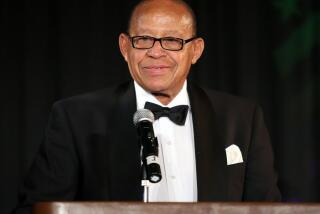Cecil Brown; Noted War Correspondent, Scholar
- Share via
Cecil Brown, who covered World War II from Rome while his boss Edward R. Murrow broadcast from London and his CBS colleagues Eric Sevareid and William Shirer were heard from Paris and Berlin, respectively, died Sunday.
The veteran war correspondent, who survived the sinking of a British cruiser, expulsion from Italy for his anti-Fascist stance and the consequences of his own critical commentary of the networks that employed him, was 80 and died of a ruptured aorta at UCLA Medical Center where he was rushed after being stricken at his Los Angeles home.
At his death, he had amassed most of broadcasting’s highest tributes, including the George Foster Peabody Award for journalistic excellence and the “best reporter” award from the Overseas Press Club, of which he served as president in the 1950s.
His work as news analyst and commentator on Los Angeles public television station KCET in the 1960s led to Alfred I. du Pont and Associated Press awards for best commentary.
Informed of his death Monday, Sevareid recalled from his Washington office that Brown was among the first of the brash young men Murrow assembled for CBS in the dark days preceding World War II.
“First was Bill Shirer, then myself in 1939 and then Cecil,” the veteran newsman said.
When Elmer Davis left the network to work for the government in World War II, Brown took Davis’ post in Washington.
“He was a great fellow,” Sevareid said of his former colleague.
Brown began as a newspaper reporter in Ohio but turned to the sea in the early 1920s and was serving on a freighter when he decided to capitalize on both his writing ability and his travels.
When his ship became the first American vessel in years to enter Soviet waters, he filed a series of articles for American publications.
Brown returned to the United States and newspaper work but then went back overseas and was hired first by International News Service and then by Murrow.
His broadcasts before the outbreak of World War II, describing the assemblage of “a comic-opera army preparing for slaughter under orders of a Duce with a titanic contempt for his own people,” succeeded in getting him banned from the Italian airwaves and eventually expelled by Benito Mussolini’s government.
He went to Yugoslavia just as German troops entered in April, 1941, and he fled to Budapest to broadcast an account of the Nazi advance.
From there, he went to Syria, Cairo, the hills of Crete and then Libya, telling the world of the fall of Damascus to the Free French, the escape of the Greek king and the advance of British troops in the African desert.
On Dec. 8, 1941, the day after Pearl Harbor, he boarded a British cruiser hoping to intercept convoys taking supplies to Japan by way of Malaya. A few days later, he found himself in the oil-slick South China Sea with the few crewmen who survived the bombing and sinking of the Repulse.
Brown was rescued and eventually got to Australia. He was on Java when Japanese planes attacked, dropping bombs “glistening like raindrops in the sun.”
At war’s end, he returned to Europe, covered the Korean War in 1952 and then became Far East bureau chief for NBC from 1958 to 1962.
Back again in the United States, he joined KCET and then taught English at California State Polytechnic University, Pomona, where he was named outstanding professor in 1980, the year he retired. While at the campus, he produced more than 50 public affairs forums. Many were broadcast on cable television and are still in classroom use.
Several years after leaving the national networks, he told The Times that “news on radio and TV today almost puts you to sleep.” Blaming the vast sums of money that news shows generate, Brown dismissed modern coverage as “just touching the surface” and lamented the demise of such commentators as himself and Sevareid.
“At least we used to be able to arouse indignation from listeners. . . . “
Survivors include his wife, Martha, who traveled with him during many of his tours of Europe and the Far East. She asks contributions in his name to the Department of Social Sciences, Cal Poly Pomona, 3801 W. Temple Ave., Pomona 91768.
More to Read
Sign up for Essential California
The most important California stories and recommendations in your inbox every morning.
You may occasionally receive promotional content from the Los Angeles Times.










